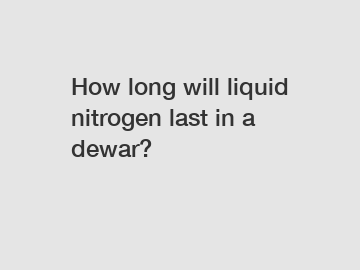Feb. 22, 2024
Machinery
Liquid nitrogen is a fascinating substance that has numerous practical applications in science, medicine, and industry. One of the most common ways in which liquid nitrogen is stored is in a dewar, a specialized container that is designed to keep the liquid nitrogen at its extremely low temperature of -196 degrees Celsius (-321 degrees Fahrenheit). But how long will liquid nitrogen actually last in a dewar? In this blog post, we will explore the factors that can affect the longevity of liquid nitrogen in a dewar and provide some tips on how to maximize the amount of time that you can store it safely and effectively.
Liquid nitrogen is a colorless, odorless, and tasteless liquid that has a number of unique properties that make it an ideal coolant for a wide range of applications. It is incredibly cold, with a boiling point of -196 degrees Celsius, which means that it can maintain its liquid form even in the most extreme temperatures. Liquid nitrogen is also non-toxic and non-flammable, which makes it safe to handle and store when proper precautions are taken.
When liquid nitrogen is stored in a dewar, it is important to understand that the dewar is not a completely sealed container. Over time, some of the liquid nitrogen will evaporate, which means that the level of liquid nitrogen in the dewar will gradually decrease. The rate at which liquid nitrogen evaporates depends on a number of factors, including the size and design of the dewar, the ambient temperature, and how frequently the dewar is opened and closed.

In general, a well-insulated dewar that is kept in a cool and stable environment will be able to hold liquid nitrogen for longer periods of time. However, even under the best conditions, liquid nitrogen will slowly evaporate over time. The rate of evaporation can be as much as 1-2% per day, which means that after a week or two, the level of liquid nitrogen in the dewar may have dropped significantly.
To maximize the amount of time that you can store liquid nitrogen in a dewar, there are several steps that you can take. First and foremost, it is important to keep the dewar properly insulated and sealed to prevent heat from entering and causing the liquid nitrogen to evaporate more quickly. Regularly checking the seals and insulation of the dewar can help to maintain its effectiveness and ensure that the liquid nitrogen lasts as long as possible.
It is also important to store the dewar in a cool and stable environment to minimize the rate of evaporation. Keeping the dewar away from sources of heat and direct sunlight can help to maintain a consistent temperature and prolong the life of the liquid nitrogen. Additionally, it is important to avoid opening the dewar unnecessarily, as each time the dewar is opened, warm air enters and accelerates the evaporation process.
In addition to proper storage and handling, it is also important to monitor the level of liquid nitrogen in the dewar regularly. By keeping track of how much liquid nitrogen is left and planning ahead for when a refill may be necessary, you can ensure that you always have a supply of liquid nitrogen on hand when you need it.
Overall, the longevity of liquid nitrogen in a dewar can vary depending on a number of factors, but with proper care and maintenance, you can maximize the amount of time that you can store liquid nitrogen safely and effectively. By following these tips and best practices, you can ensure that your liquid nitrogen dewar remains a reliable source of coolant for your scientific, medical, or industrial applications.
For more Runfeng Low Temperature Equipment, Microbulk Tank Specifications, Liquid Carbon Dioxide Micro Bulk Storage Tankinformation, please contact us. We will provide professional answers.
If you are interested in sending in a Guest Blogger Submission,welcome to write for us!
All Comments ( 0 )